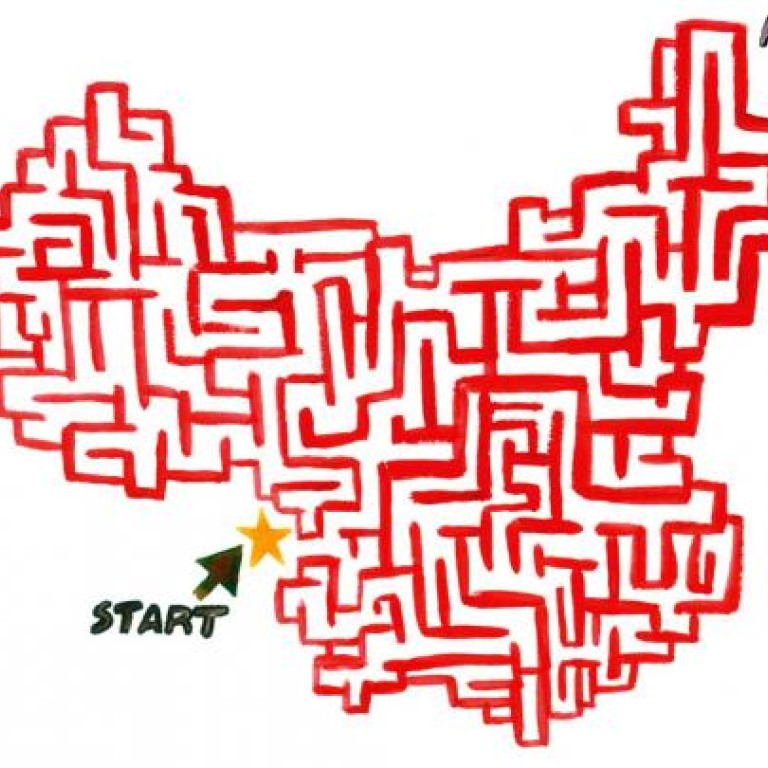
How to arrive at a China model of development
Andrew Leung examines blueprints for how China, under Xi Jinping, could begin a political transformation to create a model of development that would be admired around the world
The Communist Party says China will chart its own path of development and will not copy the Western model of multi- party politics. The need for political reform is becoming more urgent as social discontent mounts. But, given China's entrenched vested interests, most pundits have grave doubts about whether Xi Jinping will be able to deliver.
There are some who harbour patriotic hopes of grandeur. For example, Yau Lop-poon, chief editor of , an Asian weekly, says China should draw from the reform experiences of Myanmar, Singapore and South Africa to embark on a "creative transformation". Through a peaceful and systematic process, China should be able to build its own system of checks and balances that can resist the temptations of elite capitalism. The vision is to develop a model that achieves administrative efficiency, clean government, social justice and sustained, high economic growth. Such a model, if realised, would be the pride of the Chinese people and a marvel to the rest of the world.
High hopes, however, often fail to accord with reality. At any rate, a tall tower needs to be built from the ground, as the Chinese saying goes.
So it is refreshing, and extremely timely, that Professor Yu Jianrong of the Chinese Academy of Social Sciences circulated a succinct, down-to-earth, 10-year outline for China's social and political development. Published online earlier this year, it went viral on Sina Weibo among his 1.5 million followers on the popular microblogging site.
Yu's road map is divided into two phases. Phase one, from October this year to the end of 2015, advocates change in four areas.
First, people's livelihood. Rural land rights should be legally recognised; welfare provisions for lower-income groups expanded; and the (household registration) system, that discriminates against migrant workers, reformed.
Second, judicial checks and balances. The staff, finances and property of primary and intermediate courts should be managed by provincial authorities, not county or municipal governments. Lifetime tenures and high salaries for judges should be introduced, subject to restrictions on mobility and strict accountability.
In addition, a few retrograde state organs should be abolished - the political-legal committees below the provincial level (as they often take the law into their own hands), the petitioning system (outstanding grievance cases should be resolved through judicial processes), and the labour re-education system.
Third, press freedom and freedom of expression. This extends to transparency of administrative information, declaration by officials of their private assets, and prohibition of punishment for expression.
Fourth, social development and civil society, including the improvement of neighbourhood management, promotion of charitable bodies, and protection of religious organisations.
Phase Two, from 2016 to September 2022, proposes reform in two areas.
First, reform of county-level government. Yu proposes opening up elections for county-level congresses, so they become less administrative and professionalised; scrapping the system of appointing county officials from the outside; introducing competitive elections for the top county leader; and turning township governments into subordinate outposts of higher authorities.
Second, open society. This requires setting laws for press freedom and for political parties. The management of media and political organisations should be liberalised.
Yu's reform agenda tallies with a World Bank report, co-authored with the Development Research Centre of the State Council, titled .
In line with China's latest five-year plan, the World Bank report focuses on efficiency, equity and sustainability. Its prescriptions include policy measures to remove critical bottlenecks for China's development, such as by tackling unauthorised land grabs by local authorities, releasing private sector productivity, achieving fairer social provisions, enhancing greater social mobility, delivering greater financial liberalisation, including full currency convertibility, and achieving a greener economy.
At the 18th party congress, the two primary targets for the next decade were identified as fighting corruption and achieving a middle-class society by doubling income per capita by 2020.
Provided China continues to grow at an average annual rate of 7 per cent, that objective is by no means unrealistic. The above reform blueprints are likely to enhance accountability, transparency and the rule of law. This should help the new Politburo Standing Committee graft-buster Wang Qishan, known for his toughness, turn the tables on corruption.
Indeed, Xi's team of six in a more compact Politburo Standing Committee could well be "China's dream team", according to Stephen Roach, former chairman of Morgan Stanley Asia and now senior fellow at Yale University's Jackson Institute of Global Affairs. Xi is by no means a conservative and the new premier, Li Keqiang , is an avid reformer. Both hold doctorates, in law and economics respectively. Virtually all the others hold degrees in the humanities rather than engineering. Yu Zhengsheng , Zhang Dejiang and Zhang Gaoli come from senior roles in Shanghai, Chongqing and Tianjin. Together, they bring a vast pool of political and administrative leadership overseeing dynamic consumption-oriented cities. This is extremely relevant. According to the Brookings Institution, the consuming middle-class will grow from 12 per cent to 70 per cent of China's population by 2030.
Xi's presidency is expected to cover two terms, totalling 10 years. During his second term, a crop of reformers is likely to ascend to the top leadership. If under a one-party system, Xi manages to achieve all of the above reforms and development targets, he would have kick-started a political transformation that may well marvel the world. If so, perhaps the chief editor of is prescient with his vision of grandeur.

